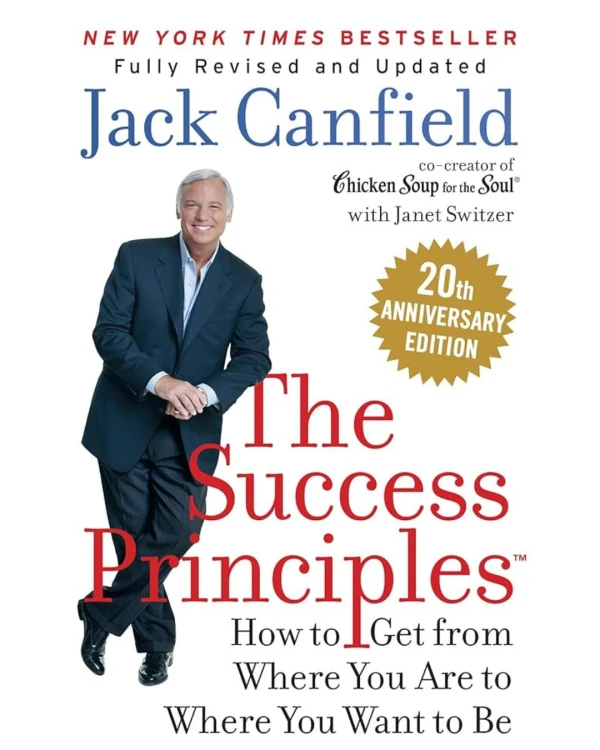Detailed Review
Jack Canfield’s The Success Principles: How to Get from Where You Are to Where You Want to Be (2005) is a book that has long been on my radar, often cited as a goldmine in the self-development and leadership literature. As someone who values actionable frameworks and evidence-based strategies, I approached this book with curiosity and a healthy dose of skepticism.
Would it offer more than motivational platitudes? Could its principles be applied in the demanding, nuanced world of professional leadership and knowledge work? After a thorough read and reflection, I found that Canfield’s work is both inspiring and practical, though not without its limitations.
Executive Overview
The Success Principles is structured around 67 distinct principles, each designed to help readers take control of their lives and achieve their goals. Canfield draws on his extensive experience in academia, corporate training, and personal development to present a systematized approach to success. The book is divided into five sections that guide readers through foundational mindset shifts, goal setting, strategic action, relationship building, and ongoing personal growth.
At its core, the book emphasizes personal agency, the idea that individuals are responsible for their own outcomes. Canfield’s first principle, “Take 100% Responsibility for Your Life,” sets the tone for the rest of the book. He argues that success is not a matter of luck or circumstance, but the result of deliberate choices and consistent action. Each principle is accompanied by practical exercises, anecdotes, and step-by-step instructions, making the book as much a workbook as a manifesto.
The principles cover a wide range of topics, including clarifying your purpose, visualizing success, building supportive networks, mastering time management, and developing resilience in the face of setbacks. Canfield’s approach is holistic, integrating insights from motivational psychology, organizational behavior, and personal productivity.
Evaluating Impact: What Works and What Falls Short
I. Strengths
One of the book’s greatest strengths is its operational clarity. Canfield excels at breaking down abstract concepts into actionable steps. Say for instance, ‘Principle 41 - Build a Powerful Support Team and Delegate to Them’, or ‘Principle 44 - Create a Network of Mentors and Others Who Will Up-Level You.’
Another standout feature is the book’s emphasis on strategic goal setting. Principles 11 and 12 (‘See What You Want, Get What You See’ and ‘Act As If’, respectively), which focus on clarifying your purpose and visualizing success, are grounded in research from organizational psychology. Canfield provides structured exercises for articulating objectives, which can be invaluable for professionals engaged in strategic planning or leading interdisciplinary teams. These exercises help readers move from vague aspirations to concrete, actionable plans.
The book also shines in its treatment of network optimization. Principle 30, which centers on building strategic relationships, offers practical advice for cultivating mentorships and alliances. In today’s interconnected world, the ability to build and leverage professional networks is a critical skill, and Canfield’s guidance in this area is indeed actionable.
II. Weaknesses
One of the most significant is its tendency to oversimplify complex environments. The “E + R = O” (Event + Response = Outcome) formula, while conceptually sound, does not fully account for the institutional constraints and systemic barriers that many professionals face. For those working within large organizations or resource-constrained environments, the idea that personal responsibility alone can overcome all obstacles may seem unrealistic.
Another limitation is the lack of specificity in advanced contexts. Some principles, such as “Reject Rejection” (Principle 18), are presented in broad terms that may not translate well to environments where constructive criticism and peer review are integral to the success process. In such settings, the ability to engage with feedback and adapt accordingly is more valuable than simply rejecting negative input.
The book’s individualistic orientation is also a potential drawback. While personal agency is important, success in many professional and cultural contexts is achieved through collaboration and collective effort. Canfield’s framework may not resonate as strongly in cultures or organizations that prioritize group achievement over individual accomplishment.
The Winning Line(s):
“To achieve desired outcomes, one must replace complaining with making requests and taking action.”
“One of the great strategies for success is to act as if you already are where you want to be.”
“You can lose the material things, but you can never lose your mastery – what you learn and who you become in the process of achieving your goals.”
Recommendation
After reading and reflecting on The Success Principles, I believe it is a valuable resource for anyone seeking to improve their mindset, habits, and professional outcomes. The book’s greatest strength lies in its ability to translate motivational concepts into practical frameworks that can be adapted to a variety of contexts. For professionals navigating complex environments, the principles on goal setting, networking, and time management are especially useful.
In my view, the most effective way to use The Success Principles is to selectively implement the principles that resonate most strongly with your personal and professional goals. For example, Principle 10 (“Release the Brakes”) is particularly helpful for overcoming self-imposed limitations, while Principle 46 (“Mastermind Your Success”) offers a structured approach to peer advisory and professional development. Principle 40 (“Redefine Time”) provides practical strategies for optimizing productivity in resource-constrained environments.
Final Verdict: 4/5
Ultimately, I would rate The Success Principles a solid 4 out of 5. It is a robust and motivating guide that offers substantial value when used thoughtfully and strategically. For those willing to engage deeply with the material and adapt it to their unique circumstances, Canfield’s principles can serve as a reliable compass on the journey to sustained success.


